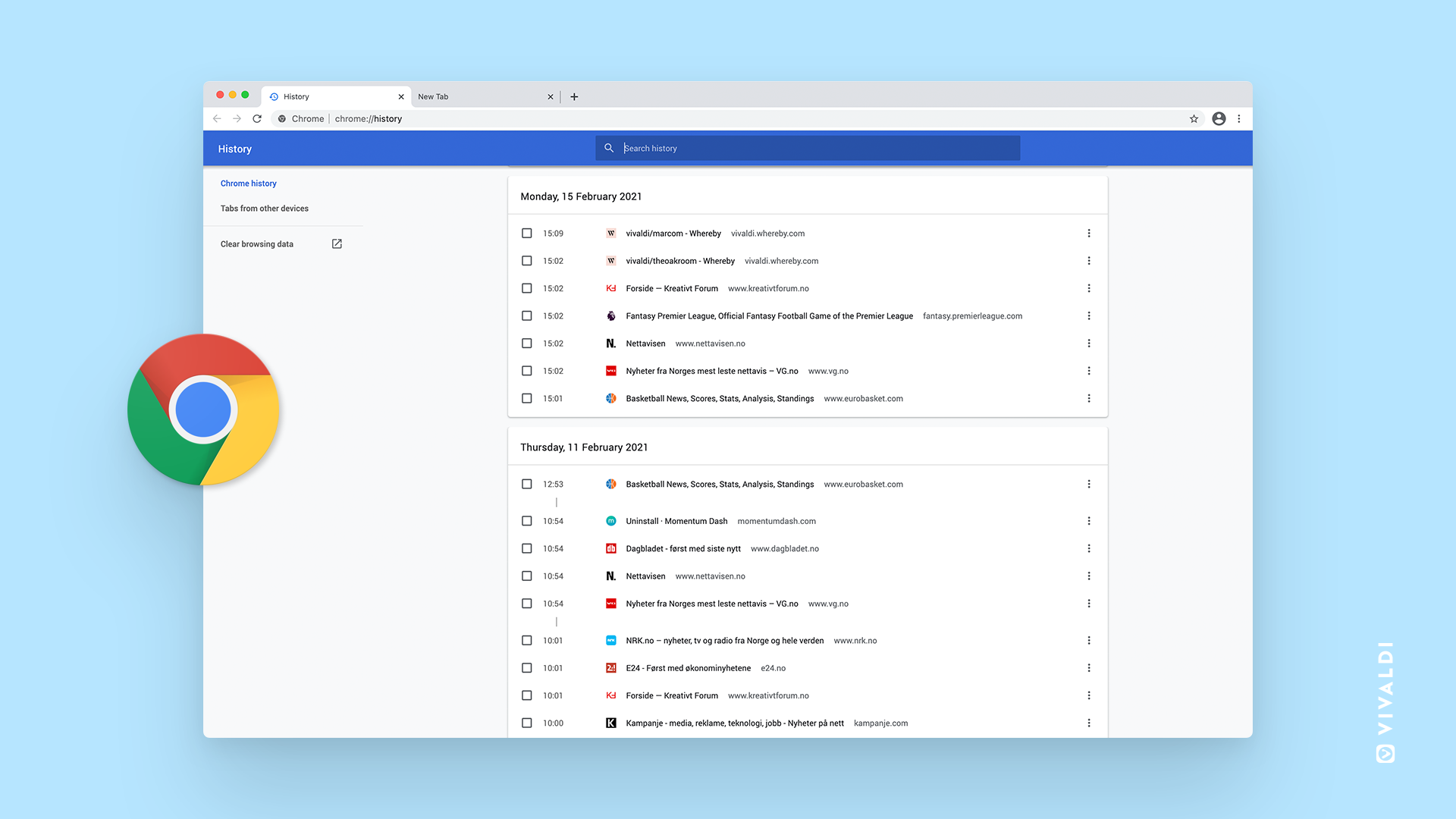An unpretentious update to your Google program history presently shows in the event that a site you visited was through an outsider application. It's not difficult to check your Google Chrome history and scratch your head attempting to recollect why certain locales are on there.
That can be on the grounds that you were coordinated to the site through an application as opposed to while perusing on Chrome. To address this, Google just changed Chrome history to add a sign in the event that a site was visited through an outsider application.
Artem Russakovskii featured the unpretentious update in a post on X. The post states, "Google Chrome history presently tells you in the event that a site was visited through an outsider application, similar to research Application or Google News. Perfect." It proceeds to credit Hamzah Malik for recognizing the change.

The post is joined by a screen capture of Google Chrome history on portable, which upholds the declaration. Three of the passages show one of the applications the banner referenced close to the URL of the site visited by means of those applications.
It's such a little update that many individuals won't see for some time or ever, yet it's the kind of good judgment expansion that we like to see.
Increasingly more applications favor clients stay inside them in any event, while getting a charge out of outside encounters, similar to a news story, while the set of experiences for the page gets kept in Chrome. In the event that you, open up Chrome, you'd scratch your head (particularly on shared gadgets), and this change demystifies what is happening a little.
Wait, What is a Cookie?
In 1994, PC engineer Lou Montulli at Netscape reformed the manner in which we perused the web with his creation of the "treat". Interestingly, site pages could recollect our passwords, inclinations, language settings and in any event, shopping baskets.
This technique should be a confidential trade of data just between a client and a site - what's known as a first-party treat. Be that as it may, in something like two years, publicists worked out how to "hack" treats to follow clients. These are outsider treats.
You can imagine a first-party treat like a shop right hand who pays attention to your inclinations and is glad to hold your sacks or garments while you make your determination - however just while you are inside their store.
An outsider treat resembles a bug from an old government operative film. It pays attention to everything in your room, yet just offers the data with its partners.

The "spy" can put this treat on others' destinations, to record what you visit and what information you enter. In the event that you've at any point considered how Facebook has served you a promotion about something connected with a report you recently read, odds are this is on the grounds that you host third-get-together treats empowered.
Unregulated internet following and observation by means of treats were the default until 2018, when the European Association's Overall Information Insurance Guidelines (GDPR) and the California Shopper Protection Act (CCPA) were presented. In the event that you have seen all the more pop-ups advising you of treats and requesting your educated assent, you have the GDPR and CCPA to thank.
The main programs to switch off help for outsider treats were Apple's Safari in 2017 and Mozilla's Firefox in 2019. Be that as it may, Google is likewise a significant web based promoting organization, with promotions making up 57.8% of Google's income starting around 2023.
Related Post: 9 New Android Features to Help You Stay Productive
They have been slowest misguided in switching off outsider treats in Chrome. With the presentation of the Protection Sandbox, they currently desire to get turning treats going at some point in 2024.
How Is the Privacy Sandbox Different From Cookies?
The subtleties on how the Security Sandbox assortment of highlights works are fairly specialized. Yet, the following are a couple of the main viewpoints. Rather than utilizing outsider treats to serve you promotions across the web, Chrome will give something many refer to as publicizing Subjects.
These are undeniable level synopses of your perusing conduct, followed locally (like in your perusing history), that organizations can access on solicitation to serve you promotions on specific subjects.

Furthermore, there are elements, for example, Safeguarded Crowd that can serve you promotions for "remarketing" (for instance, Chrome followed you visiting a posting for a toaster oven, so presently you will get advertisements for toaster ovens somewhere else), and Attribution Revealing, that assembles information on promotion clicks.
To put it plainly, rather than outsider treats doing the seeing, the highlights these treats empower will be accessible straightforwardly inside Chrome.
Is User Tracking Necessarily Bad?
While Google pitches the Security Sandbox as something that will further develop client protection, not every person concurs. On the off chance that these highlights are turned on, Google - one of the world's greatest publicizing organizations - is basically ready to pay attention to you wherever on the web.
Following innovation can apparently help us too. For instance, it very well may be useful in the event that a web-based store reminds you like clockwork you really want another toothbrush, or that this time last year you purchased a birthday card for your mum.
Offloading mental exertion, for example, updates like these, is an extraordinary way robotization can help humankind. At the point when utilized in circumstances where pinpoint exactness is required, it can make our lives simpler and more lovely.
In any case, in the event that you are not happy with observation, the option in contrast to outsider treats may not really be the new Security Sandbox in Chrome. The option is to incapacitate following by and large totally.
What Can You Do?
In the event that you don't believe your web-based exercises should be followed for the end goal of publicizing, there are a couple of direct decisions.
By a long shot the most confidential programs are expert non-following programs that focus on no following, like DuckDuckGo and Courageous. In any case, if you would rather not get that geeky, Safari and Firefox as of now host third-gathering treats hindered of course.
In the event that you don't care about some valuable designated promoting, you can leave the Chrome Security Sandbox settings on. If you have any desire to change these settings or switch them off, click the three specks in the upper-right corner and go to Settings > Protection and Security > Promotion protection.
It's muddled if flipping these highlights off will prevent Chrome from gathering these information out and out, or on the other hand in the event that it actually won't impart the information to publicists. You can figure out additional insights regarding each element on the Google Chrome Help page.
In conclusion, it's memorable's great nothing really comes free of charge. Programming costs cash to create. In the event that you're not paying towards that, then it's reasonable you - or your information - are the item. We really want to reform our opinion on our own information and what esteem it genuinely holds.

